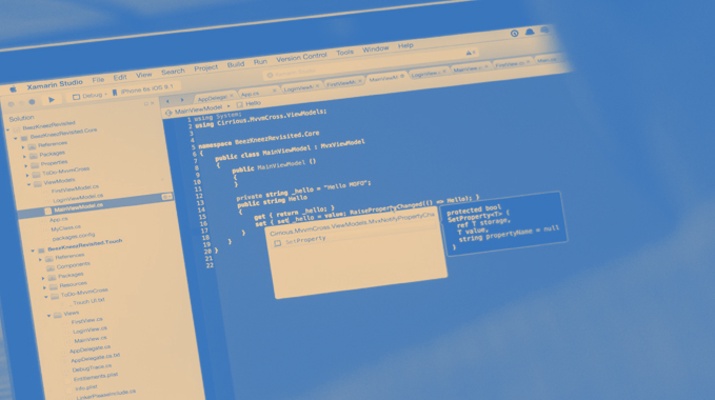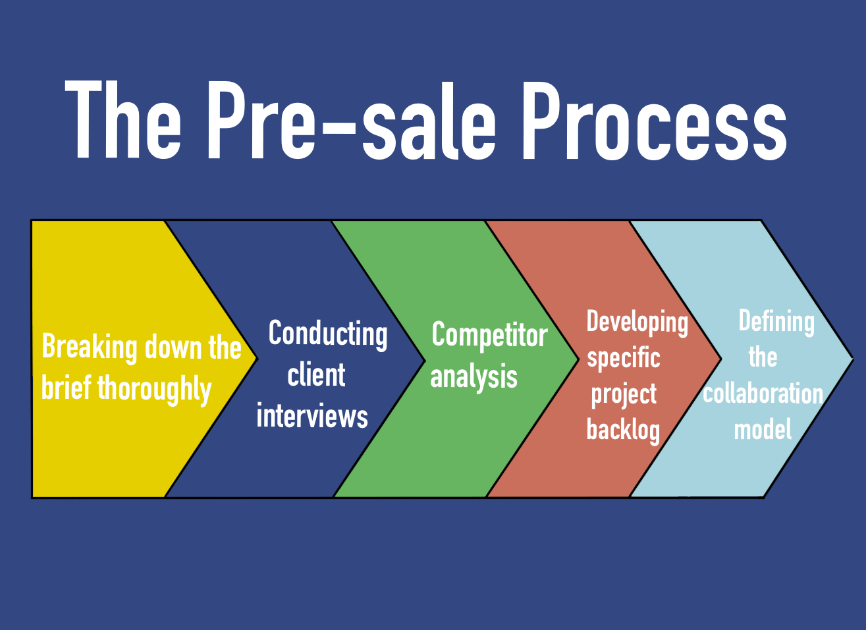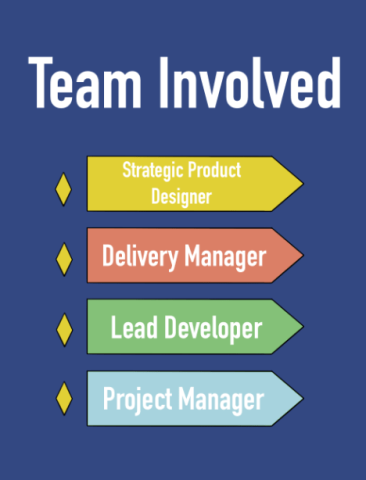Pre-Sale Paradox in Software Development: More Effort, Less Reward

Pre-Sale Paradox in Software Development: More Effort, Less Reward
Quality is considered a hardly measurable criterion in business development processes. This often leads to the common paradox: software development companies invest more effort into the pre-sale phase but become less competitive. Learn more about most companies' challenges and explore strategies to ensure the best possible result.
Workers in the business development field are probably aware that the main thing most clients care about can be boiled down to three keywords: time, budget, and quality (that famous triangle we've all seen).
Comparing the time and budget provided by different companies is not so difficult; it’s just a matter of comparing numbers. But when it comes to quality, things get more complicated, especially in the software development industry, where companies essentially sell the quality of their methodology rather than a visible product.
Certainly, there are different ways to guarantee quality, such as references, case studies, client testimonials, quick design prototypes, etc.; however, ensuring a company consistently delivers quality work often relies on subjective matters.

This is where a pre-sale paradox comes into play. While quality in that phase is considered a vital factor in decision-making, it may become a disadvantage due to a possible increase in estimated project cost. You might end up with an offer that is solid yet less competitive.
Navigating the Paradox: Challenges in the Pre-Sales Process
Business analysis is the stage of the new product development process that the business team takes very seriously and integrates into the business development operation. This is why, during the pre-sales discovery process, close collaboration with the client usually leads to uncovering more about the product details and raising additional questions.
To address these questions, the team must allocate more time and resources to their proposals, consequently increasing the estimated project cost. The paradox is that this thorough understanding of the product becomes a 'problem' in the sales process because it leads to a higher budget, making the offer less competitive. This approach means tackling issues others might overlook, thus turning an advantage into a disadvantage in the "measurable criteria of time and budget."
Yet, this paradox doesn't apply to already established businesses with tech teams and designers. Such clients usually provide the product backlog upfront and have well-established procurement processes that facilitate and ensure fair and square competition.
However, in a number of cases, when you’re competing with other agencies for new projects, you might find yourself at a disadvantage if your discovery phase takes longer. Some agencies that don’t prioritize quality in the pre-sale phase may not invest as much time anticipating potential issues, so their pre-sales process flow is simpler and quicker.
Plus, they can offer lower budgets since they don't delve deep into the project's details. Ultimately, clients, especially those less tech-savvy or experienced, often choose the cheapest and quickest option.
A fair question probably needs to be raised: why should you risk winning a project and not address the brief more simply like your competitors do?
Without a clear backlog, it’s extremely challenging to understand the client's expectations and validate feature budgets.
So, over six months, you get deteriorated client relations, a frustrated team, and, most importantly, an exploded budget and timeline, which was the reason they selected the specific delivery partner in the first place.
To be fair, this is also extremely penalizing for the agencies. They have to work to deliver the product free of charge for additional months, killing the margins and overloading the teams. It is not easy to manage financially or operationally.
Agencies and their clients must be fully on the same page before signing the contract on the scope and methodology. This directly affects the time and budget, the two key measurable factors the clients have—even if they don't explicitly accept it.
That is why striving for quality might sometimes mean losing opportunities. Clients and vendors, on the other hand, lose time, projects miss deadlines, and might never even see the sunlight.
The Pre-Sales Process: How To Ensure Quality?
Imagine how many products have been developing for months with hundreds of thousands of dollars poured in and never going live because of exposed budgets and investment cutoffs— a lot.

That is why addressing each brief with a meticulously crafted operation is essential.
As a Laravel development company, our approach to the pre-sale phase begins with our business team analyzing the project as soon as we receive the brief. During this phase, we detail the commercial aspects and gather as much information as possible about the business. This includes understanding the value proposition, the user and customer base, the internal team configuration, and the key expectations of the customers. Development starts only after this initial analysis is complete.
Who Makes Up a Pre-Sale Team?
Building a dedicated, multidisciplinary pre-sales team that will work on the new business opportunity means incorporating the following people:

- Strategic Product Designer - Responsible for editing the backlog based on the brief and client iterations.
- Delivery Manager - Responsible for the architecture of the product and all key technical decisions.
- Lead Developer - Responsible for the tech team and their workflow.
- Project Manager - responsible for adapting the right tools and proposing tailored methodologies for the project workflow.
All these profiles are the ones that are considered for engagement in the project in case the company wins the opportunity.
Instead of working with a team that might have no clue how to handle the specific feature, it’s critical to have a competent team, from sales to project delivery, that has a clear idea about the project and guarantees a smooth handover. This is an essential aspect of delivering a high-quality result to the client.
Understanding the Pre-Sale Paradox
Pre-sale is a challenging business development process that takes time and resources. It is already considered a mini-project led by the sales team.
And that is why the pre-sale paradox is so real. It’s hard to accept that the more effort you put into the presale, the more robust and solid your offer is. This is because it is built on validated and aligned visions from both parties, minimizing risks.
While all these guarantee results, they might be more expensive. But we all know that expensive is a relative term. In the end, nothing is more expensive than losing hundreds of thousands of dollars due to making the wrong partner choices.
